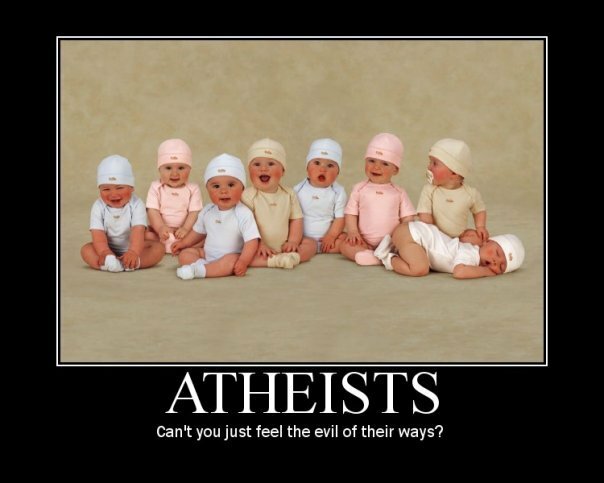The term “atheist” is different from other labels used to describe people in an important way. It’s a label for what a person isn’t instead of what that person is. It’s as if, for example, an engineer carried around a sign that said “non-doctor” instead of “engineer”. There is no immediate way, based on the sign, to tell what that person is apart from “not a doctor”. He could very well be a lawyer, a construction worker, an engineer, or a thousand other things. Where does this term come from?
The strictest and broadest definition of atheism is lack of a belief in God. That’s it. It’s not necessary to belong to a particular philosophical current, nor to be a scientist, nor of a certain political persuasion. Whatever the reason for disbelief in God, the fact of non-belief is what defines a person as an atheist. A difference from the example of the non-doctor above who could be just about anything else, is that there are only two possible stances of belief about God: either one believes that he exists or that he doesn’t. All non-believers in God are atheists, since they can’t believe and disbelieve in God at the same time.
Types of Atheism
There are basically two ways of breaking down atheists: one is by the reasons for their atheism and the other is by what they’re willing to affirm about God’s non-existence.

For the first case, first we must point out that not all atheists are so for the same reasons. If we stick to the technical definition, there’s many more atheists than it may seem at first. All babies and small children are atheists, since they cannot believe something they don’t know or understand. Also, as far as we know, all animals are atheists, too. This is what happens when identifying things using labels about what they aren’t instead of what they are. Even rocks are atheists.
However, there are many religious people who are also atheists: the secular current of buddhism, for example, has no gods. Even though supernatural characteristics are attributed to the world (such as reincarnation), none of them are due specifically to a god. Other religious groups like the raelians substitute aliens for gods and therefore are atheists as well.
It is common to assume that an atheist is he who lacks a belief in God because of a process of skeptical analysis of the question. In these cases, which do not include all atheists, atheism is a consequence. This is important, since a common conception is that becoming an atheist produces certain thoughts or behaviors, when it’s the other way around. There is a way of thinking that provokes atheism in some people. However, it may be the case that some people apply that same thinking process and come to different conclusions (such as “God exists”).
When we focus on this last group of atheists by conviction, we can apply the second criteria for comparison among them: what they are willing to affirm about God’s non-existence.
Weak and Strong Atheism
Once again, these terms are not very exact but are already used extensively. Basically, weak atheism consists of considering the arguments and evidence for the existence of God to be insufficient, and therefore the belief in Him is considered unjustified. In strong atheism, the evidence is considered to be not only insufficient for God’s existence, but to actually support the idea that there is no God. This is a subtle but important difference! Weak atheism stops at the point where evidence and arguments for God are deemed insufficient; strong atheism takes those arguments and evidence to counter with a positive claim that God doesn’t exist.
Atheism and Agnosticism
Another point worth discussing is the difference between agnosticism and atheism. First we have to point out that they are not mutually exclusive, since agnosticism is a stance on knowledge and atheism is a stance on belief. Agnostics affirm that there is no way to know, by way of a test or demonstration, if God exists or not. It is possible to be, therefore, agnostic and also believe or disbelieve in God. In fact most believers—when pushed—will admit that they can’t know for sure there is or isn’t a God, but that they believe anyway. In this case, this makes them “agnostic theists”. Likewise, atheists usually concede that they can’t know for sure there is no God, but they believe there isn’t. It’s worth noting that the same people who usually call themselves “agnostic” usually don’t know this subtlety! If we were strict, they would have to specify if they’re agnostic theists (believers) or agnostic atheists. By default, if they say they’re agnostic and nothing else, then they are also atheists, since they can’t believe in a God they don’t know, and that lack of belief is the definition of atheism.
Common Misconceptions
Among the most frequent misconceptions about atheists is supposing that their way of thinking can be known or deduced from the fact that they are atheists. As we saw above, an atheist has a “non-theist” label on him. But, just as the “non-doctor” could be anything else, so could an atheist believe in all kinds of things besides God. Non-belief in a God says nothing about other beliefs the atheist has or doesn’t have. An atheist could be liberal, conservative, anarchist, communist, capitalist, raelian, buddhist… Any other belief or set of beliefs other than God.
This is related to another common mistake, which is to assume that, because a person doesn’t believe in God, then he or she doesn’t believe in anything. This is like saying that “non-doctors” are nothing, when they could be engineers, lawyers, plumbers, accountants, and much more.
Finally, there are those who consider atheism to be just another religion. This is the biggest misconception of them all, and demonstrates that they don’t know a thing about what atheism is! To say atheism is another religion is like saying that not collecting stamps is a hobby.
